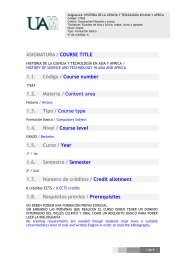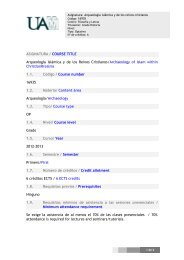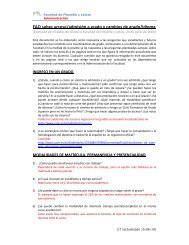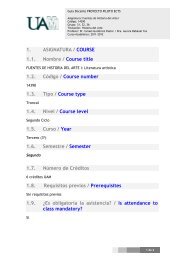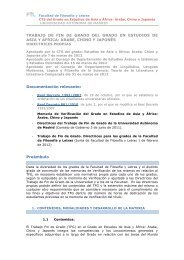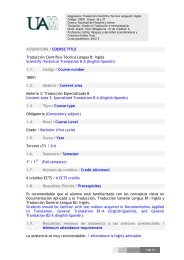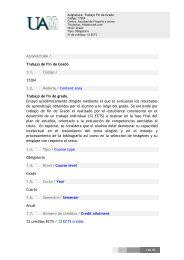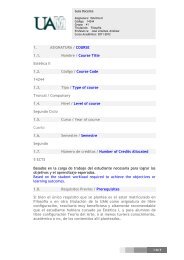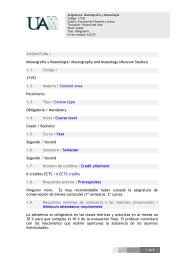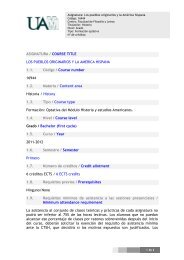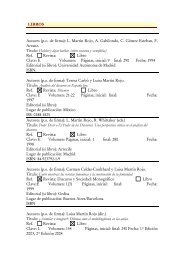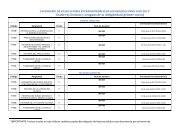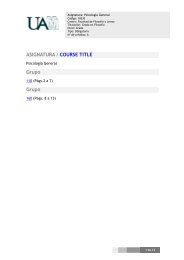Identidades culturales europeas - Facultad de Filosofía y Letras
Identidades culturales europeas - Facultad de Filosofía y Letras
Identidades culturales europeas - Facultad de Filosofía y Letras
You also want an ePaper? Increase the reach of your titles
YUMPU automatically turns print PDFs into web optimized ePapers that Google loves.
ASIGNATURA: IDENTIDADES CULTURALES EUROPEAS<br />
CÓDIGO: 17325<br />
CENTRO: FACULTAD DE FILOSOFÍA Y LETRAS<br />
TITULACIÓN: LENGUAS MODERNAS, CULTURA Y COMUNICACIÓN<br />
NIVEL: GRADO<br />
TIPO: FORMACIÓN BÁSICA<br />
Nº DE CRÉDITOS: 6 ECTS<br />
other”. The European colonial inheritance: Spain, France and Great<br />
Britain.<br />
Unit 4: LINGUISTIC AND CULTURAL DIVERSITY. Multilingualism in<br />
Europe. Majority and minority languages in Europe. Language and<br />
culture: languages as cultural heritage of Humanity. Linguistic<br />
relativity (Sapir-Whorf).<br />
Unit 5: IDENTITY IN SPANISH/FRENCH/ENGLISH-SPEAKING SOCIETIES<br />
(<strong>de</strong>pending on the stu<strong>de</strong>nt’s main language)<br />
UNIT 5: MAIN LANGUAGE SPANISH<br />
I. I<strong>de</strong>ntities of the Spanish language: The rise of standard and of<br />
i<strong>de</strong>ntity.<br />
II. Self-image and the image of Spanish around the world.<br />
III. Languages and varieties of Spanish in the Spanish-speaking world as<br />
perceived by their speakers.<br />
IV. Acculturation, multiculturalism and integration in the Spanishspeaking<br />
world.<br />
UNIT 5: MAIN LANGUAGE FRENCH<br />
I. I<strong>de</strong>ntities and territory. Regions and <strong>de</strong>partments. The evolution of<br />
French cities. The “banlieue”.<br />
II. I<strong>de</strong>ntities and society. Multiculturalism. Immigration. Acculturation<br />
and integration. Reflection in literature and art. Gen<strong>de</strong>r i<strong>de</strong>ntity.<br />
Intellectuals and the media. The <strong>de</strong>bate on “national i<strong>de</strong>ntity”.<br />
III. I<strong>de</strong>ntities, history and memory. I<strong>de</strong>ntity and i<strong>de</strong>ntification. Myths,<br />
“lieux <strong>de</strong> mémoire”. Symbols. La “République” and embodied<br />
values.<br />
IV. I<strong>de</strong>ntity and otherness. Looking at and <strong>de</strong>picting “the other”.<br />
Memory of colonization and slavery. Racism and anti-Semitism.<br />
Relationships between France and its former colonial empire:<br />
Africa, Québec.<br />
UNIT 5: MAIN LANGUAGE ENGLISH<br />
I. The Norman invasion and the <strong>de</strong>velopment of the English language.<br />
II. Gettysburg and American rhetoric.<br />
III. London and communication in the digital age.<br />
This section of the module extends cultural horizons beyond the boundaries of<br />
Europe to inclu<strong>de</strong> the English-speaking world. The general aim is to take three<br />
8 <strong>de</strong> 12



